-
Mike Leigh: MR. TURNER (2014)
MIKE LEIGH: MR. TURNER (2014) ]

Timothy Spall in Mr. Turner
Leigh's beautiful non-biopic J.M.W. Turner biopic skirts convention so closely viewers may miss it
In his Topsy Turvy-like movie about the great English working-class-origins landscape painter Joseph Mallord William Turner (1775-1851), Mike Leigh flirts dangerously closely with conventions and emerges with a sense of originality so subtle it's not certain audiences will get what he's doing. What could be cornier than a picture about a landscape painter that's full of mimicry of his classic uses of sunlight and haze? With the help of cinematographer Dick Pope, this is just what Mr. Turner does, yet it's repeatedly breathtaking. The "Fighting Temeraire," the boat on the way to demolition in the celebrated painting, is added in by CGI; but the water and the light were captured by Pope. Nothing could capture the magic of the painting in the National Gallery (no reproduction can) but with his color widescreen images Pope delivers beauty on top of beauty without seeming heavy-handed or conventional.
What would be more obvious than a sky above-mud below portrait of an artistic genius who produces gorgeous and etherial images yet is a crude, inarticulate boor? Mr. Turner delivers that kind of obvious contrast too. Yet thanks to the subtle, meandering specificity of Leigh's action (influenced no doubt by his working methods of a long period of improvisational character development rehearsing leading up to the shoot), and due also to Timouthy Spall's complexly enigmatic character portrayal, a mass of downward looks and a symphony of communicative grunts, this standard contrast comes to seem both inevitable and unique.
J.M.W. Turner, as seen here with his father, his ex-mistress, his housekeeper-cum-lover of convenience and his naive Margate final mistress Mrs. Booth (Marion Bailey), is a classic obsessive type, whose fascination with color and light and originality in manner and media of painting (later mocked by his enemies in a music hall skit), is depicted not by any declarations or debates, but through moments of action. (Spall has explained that he spent several years learning how to paint before the making of the film.) Turner is hardly a high liver. We barely even see him eat (there's a bit of crude sex with the housekeeper, and initiation of relations indicated with Mrs. Booth). But we see pigments ordered and his father mixing them. We see canvases set up. We see morning and evening light contemplated. We see Turner rushing from one place to another. He does not acknowledge having any children (he had several by the earlier mistress, played by Ruth Sheen); he has no use at all for the ex-mistress. He is abrupt with the housekeeper. He seems hard on his father, though they are like brothers, and kiss on both cheeks when they meet.
In everything Turner is a man illustrating the first and sacrosanct rule of an artist: "The important thing is to be doing the work." It's all that matters. All else is secondary. This may go against the bourgeois artist pattern of those, like Magritte, who go off to their studio every morning as to a desk job, and come home punctually at night. But how many serious artists are like that? Ultimately Turner's obsessiveness in Leigh's film isn't a romantic cliché, but more a no-nonsense representation of artistic practice of all artists whose genius and commitment make their work great and their private lives a bit of a shambles.
The other element of course is the setting and the period feel, which also risk seeming merely conventional. These Leigh has said are as thorough and authentic as they could make them, however inadequate that may turn out to be. We begin with a standard costume-drama street scene, with a horse-drawn carriagte tooling along an elaborate period-authentic street. And this is where Mr. Turner runs the greatest risks -- because the film may seem to look very much like a Masterpiece Theater TV drama, and the 2 1/2 hour run-time may make you think it ought to be a mini-series. Look more closely, though. Because Mike Leigh films, even the most Masterpiece Theater-ish, are essentially maverick, sui generis works, playing their Englishness for all they've got, using typically excellent English actors, but going their own way.
It's been said that some of the most memorable moments of Mr. Turner are those of the artist with other artists, notably the "problematic" loser of an biblical painter Hayden (Martin Savage) , and the whole row of other painters at the Royal Academy (a magnificently realized setting). This is not so certain. Turner's run-ins with the annoying and pathetic Hayden are examples of Leigh's liking for colorful and funny bits. They also show Turner not suffering fools gladly. As for the Royal Academy encounters with other artists, well-staged though these are visually, they feel perfunctory, a costumed reading-off of an indexed list of names. They show how the outer edges of Leigh's films at times can seem unnecessary. Like so many 2 1/2 hour films, even this one could have lost 15 or 20 minutes without pain and with more focus. But Leigh treasures his sense of naturalism and his sense of milieu, and these are superbly rich, not only in human detail but in historical atmosphere.
Would one have liked to cut out the highly satirical representation of a young, spoiled, lisping, slightly nelly John Ruskin (Joshua McGuire), the budding critic who champions Turner's proto-impressionist, increasingly abstract work at a time when the pre-Raphaelites are gaining center stage? No, that's another one of Leigh's funny bits, and another sign of Turner's total independence and focus. He doesn't promote himself. He hides his identity (at first with Mrs. Booth). And he does not care if he is being promoted. (He rebuffs Ruskin's dismissal of Claude Lorrain with a comparison so crude the young snob doesn't seem to get it.)
Would one cut the sequence where Turner has a daguerreotype made, asking the photographer many questions and then saying, with throwaway fatalism, "Then I think I'm finished"? Of course not, because it's another poignant bit of art history. Turner isn't seeing himself out-dated, but seeing the world change. Mr. Turner is made up of this collection of segments, sacrificing strong narrative, while not avoiding biopic conventions (death scene and bequeathment declaration). This, besides the subtle skirting of conventions, is another reason why conventional audiences may not embrace this film, or if they do, will do so for the wrong reasons. But for me its magic remains in its overriding sense of a man whose life more than anything else is a passionate pursuit of shimmering luminosity.
 ....................
.................... 
DP Dick Pope at P&I Q&A..................... Mike Leigh [CK Photos]
Mr. Turner, 149 mins., debuted in Competition at Cannes, where Timothy Spall won the Best Actor prize. Many other international festivals, including Telluride and Toronto. Screened for this review as part of the 52nd New York Film Festival. US theatrical release (Sony Pictures Classics) 19 December.
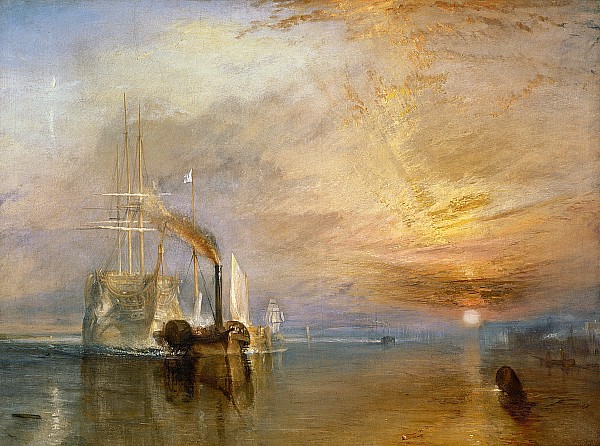
"The Fighting Temeraire tugged to her last berth to be broken up" (1838)
Last edited by Chris Knipp; 03-29-2015 at 11:55 AM.
-
Paul Thomas Anderson: INHERENT VICE (2014)
PAUL THOMAS ANDERSON: INHERENT VICE (2014)

Katherine Waterston, Joaquim Phoenix in Inherent Vice
Thomas Pychon's stoner SoCal private eye novel gets a worthy if perhaps too-faithful adapter in P.T. Anderson
As Paul Thomas Anderson's Inherent Vice begins it's 1970, in an LA beach enclave called Gordita Beach. Things start off when an old girlfriend, Shasta (Katherine Waterston) turns up at the pad of mutton chop, straw hat wearing stoner private detective Doc Sportello (Joaquin Phoenix) to beg him to help protect her new lover, millionaire real estate developer Mickey Wolfmann (Eric Roberts), from being thrown into the "loony bin" by his wife to seize his money. Then Shasta and her lover both disappear, and Doc is led to a boat called "Golden Fang," which is also perhaps a drug ring, or a dentists' investment scheme. Things get more and more complicated and goofy. More and more characters, subplots, and suspicions arise, the film becoming, in the words of Todd McCarthy in Hollywood Reporter, a "dazed journey through the mash of corrupt cops, druggies, new age cultists, hookers, Nazi bikers, Black Power toughs, real estate tycoons, Nixonian politicos and free love chicks that was L.A. forty-four years ago." Over and over, Doc runs into ambitious, aggressive, but not entirely unfriendly LA cop Detective Christian "Bigfoot" Bjornsen (Josh Brolin), a kind of pal-cum-nemesis for him. The action is continuous and humorous, though also sometimes dark.
This is an accomplished film, as one would expect from P.T. Anderson, but a big departure from what he has done before in tone and look. Certainly a remarkable artifact, it's also something of a disappointment. The comedy is ultimately muffled, the point is obscure -- other than multiple homages to the period and to the noirs and neo-noirs that celebrate it, like Robert Altman's The Long Goodbye. Chinatown, and Night Moves. The Zucker-Abrahams-Zucker film comedies are also mentioned among PTA's many sources and inspirations, not to mention Kiss Me Deadly, The Big Sleep, and Cheech and Chong's Up in Smoke. (Not, evidently, James Elroy, and not really much of a film as beautifully constructed as Chinatown, despite its mention.) Though word is there was plenty of improvisation on set, the basic plotline is faithful to Pynchon. In fact that seems to be the main problem: it's not clear what the director is doing other than playing around with his source material a bit. And having a bit of fun doesn't seem enough for a filmmaker this intense and this brilliant. Note also that those many sources are not noted for their good storytelling (The Big Sleep's action notoriously incomprehensible even to the cast and crew). A pity someone noted for neat and tidy construction, like Elmore Leonard, didn't serve as a model.
This is the first movie adapted from a Thomas Pynchon novel, and for you statisticians out there, it's also PTA's first literary adaptation and his seventh feature, based on Pychon's seventh novel. This is a film that could conceivably yield endless pleasures to the obsessive cultish re-watcher. First time through, for someone who hasn't read the novel (or any Pynchon novel) -- well, I have to say it's the most disappointing PTA film I've encountered, and I even managed to like Punch Drunk Love; I'm a pretty big fan. At two and a half hours, with bevies of characters with funny names played by interesting but sometimes not that well-known or easy-to-recognize actors (Eric Roberts, for instance: I didn't guess it was him). -- and involved in (stoned) film noir plot(s) that interconnect but keep spinning out and out and out, introducing new characters and possibilities in every scene or two, it's crazier than David Fincher's Gone Girl. Gone Girl felt crazy and over-inventive too, but on a more modest scale. I have a feeling that surely Inherent Vice is "better" than Gone Girl, that it comes from a more distinguished literary source, at least. But Gone Girl is more conventional and accessible movie fun, with the kind of surprises and climaxes you can latch onto and enjoy. Basically these two big long much-hyped new American movies are almost equally shapeless, or lacking in strong, satisfying narrative structures. Minute to minute and scene to scene, Inherent Vice is fun, but one starts feeling one isn't in on the joke.
Before I watched Inherent Vice the person next to me, another attendee of the 52nd New York Film Festival in which it was featured, told me that every good, smart movie has to have a subtext, and that (in her view) Gone Girl had fallen short because it lacked one. This is probably true. Fincher's new effort, accomplished as it is, is still basically just clever, expensive cinematic playing around with skillful schlock. What about Inherent Vice? Does it have a subtext? You would think that anything by a famous, certifiable post-modern novelist would, even sub-text on sub-text on sub-texts. But more than one of the reviewers of the book when it came out in 2009 noted that it's unironic, embracing SoCal's most stoner days of the late Sixties and early Seventies with nostalgic enthusiasm and looking on its bumbling (but not dumb) hero, the pothead, acid-dabbling private dick protagonist Doc Sportello with kindly indulgence. As Doc (the greeting "What's up, Doc?" is used once too often), Joaquin Phoenix, on mellow autopilot, seems much at ease. But he also seems unfocused, and lacks that intensity and precise timing he displayed in Anderson's previous film, The Master.
Mind you, as I said, the re-watching potential of this movie is high, and Anderson's brilliant use of actors makes for some amusing cameo-like moments. Martin Short is delicious as a cokehead dentist. It's fun watching Benicio Del Toro, Jena Malone, Reese Witherspoon, and the others come and go. Joanna Newsom’s readings of Pynchon's narration as voiceover provide a nice extra layer of nostalgia and irony -- or perhaps just adds sexy spice to the confusion.
Anderson may be having fun here. Actors in the film report a sense of chaos, but a pleasant atmosphere, on the set. This is Anderson letting go, easing up from the epic intensity of previous films. But there is not much in its place. There are funny moments, yes, but the humor becomes muffled. Jokey moments do not make comedy. And if timing is essential for comedy, and it usually is, Phoenix undercuts the humor when he's on screen. The film grinds to a halt with the stoner mood he carries around. Anderson jolts the film awake by introducing new incidents and new characters in every successive scene. But that's not enough. It's fun to be challenged, not much fun to be befuddled.
Inherent Vice, 149 mins., debuted 4 Oct. 2014 at the 52nd New York Film Festival, where it was screened for this review. Presented as the NYFF Centerpiece film, and its world premiere. Opens (limited), 12 Dec., and 9 Jan. 2015 (wide) (Warner Bros.)
Last edited by Chris Knipp; 11-19-2014 at 11:56 PM.
-
Nick Broomfield: TALES OF THE GRIM SLEEPER (2014)
NICK BROOMFIELD: TALES OF THE GRIM SLEEPER (2014)

NICK BROOMFIELD AND PAMELA BROOKS
Serial killing of women in South Central Los Angeles
Nick Broomfield has made a clean, forthright documentary about dirty, ugly material: sex-related serial killings in the L.A. ghetto, and the cruel indifference of the L.A.P.D. to the welfare of black women and murders of prostitutes. Making himself an understated but ever-present character in his film, Broomfield focuses on two interrelated topics. First is his personal and revealing investigation of the life of Lonnie Franklin Jr., arrested in South Central Los Angeles in 2010 for the serial killing of who knows how many women. In this Broomfield and his two-man crew are materially aided by Pam (Pamela Brooks), a lively local former crackhead and prostitute ("crack whore") he hires on as navigator and source of contacts. (He's not so bad himself at getting three male neighbors to talk, and open up as they talk more.) The second topic is sociological: sexism, the economic and racial divide, politics, police corruption. There's an organization of black women pushing back at the police and the city's long indifference to this case, the Black Coalition Fighting Back Serial Murders. Its leader, Margaret Prescod, is much heard from. (This might hijack the film, but Pam and Broomfield's investigation is too vivid and intense to allow that to happen.) It seems the cops had a practice of identifying murdered prostitutes as non-human, and some thought Franklin was doing good by eliminating them. The mayor, police chief, and soon-to-become governor again Jerry Brown congratulate themselves for capturing Franklin. But the murders go back to the 1980's. If they had bothered to investigate then and questioned prostitutes and crack addicts, the cops could have apprehended Franklin and cut short the killings twenty years ago. They didn't want to. They deliberately let it slide. This may be the "message" of the film, which one writer calls Broomfield's "magnum opus." But Kurt & Courtney (1998), Biggie & Tupac (2002), Aileen: Life and Death of a Serial Killer (2003) and the docudrama Battle for Haditha (2007) seem equally worthy examples of Broomfield's skill at taking walks on the wild side and unearthing ugly truths. What is nice about Tales of the Grim Sleeper is that it seems to follow more or less the chronology of Broomfield's investigation, and reads like a juicy muckraking magazine article for Rolling Stone or Vanity Fair whose sources are always clear. But this has some uncensored bits, crude language and disgusting images of perverted sexual practices that are too unpleasant for many viewers. Cinematography by Nick's son Barney, who worked on Hubert Sauper's recent We Come As Friends (ND/NF 2014).
Tales Of The Grim Sleeper 105 mins., debuted at Telluride, also shown at Toronto. Screened for this review as part of the 52nd New York Film Festival, where it was the New York premiere and the only documentary included in the Main Slate of the festival. NYC theatrical release begubs 19 December 2014 (Quad Cinema). To be shown on HBO 27 June 2015.

NICK AND PAM @ NYFF P&I SCREENING
[CK Photos]
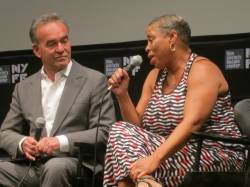
Last edited by Chris Knipp; 04-20-2015 at 02:50 PM.
-
Olivier Assayas: CLOUDS OF SILS MARIA (2014)
OLIVIER ASSAYAS: CLOUDS OF SILS MARIA (2014)

JULIETTE BINOCHE AND KRISTEN STEWART IN CLOUDS OF SILS MARIA
A well-made film that never seems as sophisticated as it thinks it is
Clouds of Sils Maria is an accomplished, well acted, but labored and self-conscious film created by Olivier Assayas for Juliette Binoche. Maria Enders, her character, is a famous forty-year-old actress who's asked to take on the role of the older woman in a revival of a play called Maloja Snake, in which twenty years earlier she played the younger one, Sigret, a springboard to fame for her then. In the play, the young woman is an assistant to the older one, and a lesbian affair develops and the cruel, manipulative Sigret dumps her boss, driving her to suicide. As she debates taking on this less flattering role, Maria practices her lines with her twenty-something personal assistant Valentine (Kristen Stewart), with whom she has a relationship not lesbian, but perhaps too familiar and competitive to be properly professional. Meanwhile the actual part of Sigret in the revival is offered to a cocky and controversial young media superstar, Jo-Ann Ellis (Chloë Grace Moretz, the only actor who brings any humor to the screen). While issues of today's even more media-dominated world press upon Maria with interviews, awards ceremonies, fashion shoots and the like, Chloë Grace Moretz's Lindsey Lohan-like character turns out to be both scandalous and smart, if not necessarily wise: she's dating a hip, handsome young English writer called Christopher Giles (Johnny Flynn) whose wife attempts suicide as a result.
Most of the action takes place in the Swiss Alps. Both "Sils" and "Maloja Snake" refer to the alpine region from whence comes the author of the play, understandably an idol of Maira Enders', whom she and Val were coming to a ceremony in honor of, but then dies just before they arrive. Assayas has said he originally thought of using Fassbinder's The Bitter Tears of Petra von Kant as the play, then decided to use a simpler version of the story of his own invention.
Clouds of Sils Maria has a great deal of gloss, but its over two hours' length could have used some cutting. There is much drinking and smoking and forced laughter between Val and Maria, yet their dialogue isn't as sharp or as revelatory as it might have been, despite being over-explanatory. Binoche's slightly artificial manner when acting in English underlines this. Some of the alternations between acting and being are cool, though.
The revelation of the film, however, is Kristen Stewart. Hitherto branded as a mere pop-culture creation for her part in the mostly execrable "Twilight" series movies, she's the best thing here, articulate and smart, her naturalness in interacting with Binoche making Binoche look better. Who knew that, if given material as intelligent as this, she would take it on with such ease and fluency? This should open up Stewart's career to more sophisticated roles now, including more European ones.
Mike D'Angelo points out in his Cannes review in The Dissolve that this brings together elements of two of Assayas's (key?) previous films: the "knowing film-world milieu" of Irma Vep, and the "poignant juxtaposition of generations" of Summer Hours. D'Angelo calls Sils "a typically smart, incisive, beautifully crafted analytical exercise" for Assayas, but notes that it's "too carefully worked out to be particularly intuitive." More than that, it's too pleased with its own cleverness and more heavy handed and self-important than it ought to be, and it relies on a plot structure whose parallelisms are overly self-conscious.
Some other elements aren't quite right. For all Assayas' elaboration of dialogue (and the line practice between Val and Maria goes on and on), the film's structure feels in some ways clumsy. Binoche isn't forty as Maria's supposed to be but fifty, of an age past the middle-age self-doubt of her character. Toward the end, Stewart's character simply disappears after an incident in the mountains: there's no transition. Among the excesses (too much of some secondary characters, like the play director) there are glimpses of the play revival, with an over-elaborate, ultra-modern set inexplicably and unnecessarily containing a bevy of minor characters -- or are the stagehands? This film is (in current parlance) "layered," but its self-reflexiveness and dark-mirror parallelisms aren't particularly subtle. As in Kiarostami's Certified Copy, also starring Binoche in self-conscious English, this is a European art house film reveling in its literary contrivance but only momentarily (when Stewart or Moretz are talking in some scenes) coming to life. Apart from all the travelogue shots of mountains, fog, and clouds to surging music, for the most part this feels more like a stage play than cinema.
Clouds Of Sils Maria , 124 mins., debuted at Cannes, shows at various other festivals. Screened for this review as part of the 52nd New York Film Festival. At the Q&A for press, Kristen Stewart again showed herself to be notably confident and smart. It was disappointing to find Binoche and Assayas seeming to refer to Summer Hours, a lovely, humanistic work, as if it somehow wasn't a real movie but Sils Maria is. Sils does certainly attempt to delve more into the world of women's feelings, which is what Binoche wanted. But the media stuff (and particularly all the references to tablets, smart phones, social media and paparazzi) adds little profundity or relevance, though. The film came out in France (as Sils Maria) 20 August 2014 and got good reviews (AlloCiné press rating 3.8): the interplay of "art" and "life" was approved of. This may be a better film to talk about than to watch, but ambitious it certainly is.
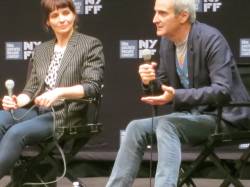
BINOCHE, ASSAYAS @ NYFF P&I Q&A

KRISTEN STEWART @ NYFF P&I Q&A
Last edited by Chris Knipp; 10-13-2016 at 09:22 AM.
-
Robert Kenner: MERCHANTS OF DOUBT (2014)
ROBERT KENNER: MERCHANTS OF DOUBT (2014)

The PR guys -- "pundits for hire" -- behind climate change denying
Robert Kenner is a muckraking documentary filmmaker of the anti-corporate kind. He is known for the 2009 Food, Inc., a film showing that US food production is a virtual monopoly of a small number of corporations. In Merchants of Doubt, he fixes his sights on shills, think tanks, and lobbyists whose aim is to debunk global warming, in the interests of producers of "dirty" energy, mostly petroleum and coal. His first discovery and perhaps most important revelation is that many of these people previously worked to debunk the danger of tobacco smoking. This failed; nobody can credibly claim that smoking doesn't kill you and that nicotine isn't addictive. So they moved on to the far more important cause: climate change. Kenner's metaphor, his frame-image, is of the professional magician or card manipulator. The "merchants of doubt," the agents of climate change deniers, use similar tricks, he suggests. Only a magician is honest about what he is doing. These guys aren't.
This is a conventional "issue" documentary. The issue is important, but the style of the film, a mix of talking heads and perky visual aids, is nothing unusual. In fact, much of the material is familiar too: if you watch "issue" documentaries, from An Inconvenient Truth on, you're aware of global warming as depicted in films. A stunnng example is Jeff Orlowski's 2012 Chasing Ice, which documents the disappearance of glaciers. Chasing Ice, made over time by a then Stanford student, little more than a kid, which popped up at Sundance two years ago, is a stunning proof of what the heating up of the planet is doing. It might be more powerful to raise awareness.
Kenner's film is a partial explanation of why nothing substantial is being done by the US to reverse or slow down global warming. Perhaps the biggest explanation is that to control this process requires, as Merchants of Doubt mentions toward the end, requires changes in our way of life all over the planet that it's virtually inconceivable. The more specific obstacle is the oil companies. These are the richest and most powerful corporations on the planet. How do you stop them from manipulating the situation to go the way they want? Merchants of Doubt focuses on the agents of these corporations, their PR men.
The specific interest of Kenner's new film is that it identifies a number of people on both sides and presents their stories. Naomi Oreskes and Erik Conway are people who have documented the anti-climate change hype-purveyors. Various lobbyists or spokesmen (some scientists, some mere lobbyists or spin doctors) are also named and chronicled in the film. For anyone interested in fighting in the cause of saving the planet, there is useful information here not only about who the main opponents like Exxon Mobil and the Koch brothers are, and who their agents are, but the kinds of arguments they present and the venues in which they typically present them. But the film isn't a shocker like Chasing Ice or comprehensive and basic like An Inconvenient Truth, and ma tend to function more (though not entirely: newcomers to the issues can be shocked by this too) as preaching to the converted. It might even cut the other way though: as Justin Chang points out in his Telluride review for Variety, this film is so "intrigued by its designated villains that it almost conveys a perverse form of admiration, and the fascination proves contagious." They're slicker than scientists, who, Kenner shows, though the ones who know the subject are not always best at conveying what they know. This film is also a detailed study of lying and deception for money, a practice that can be observed in other fields.
This film was screened for this review as part of the Spotlight on Documentary sidebar of the 52nd New York Film Festival.
Merchants of Doubt, 96 mins., debuted at Telluride and was purchased by Sony Pictures Classics.
Last edited by Chris Knipp; 11-20-2014 at 12:00 AM.
-
Alex Ross Perry: LISTEN UP PHILIP (2014)
ALEX ROSS PERRY: LISTEN UP PHILIP (2014)
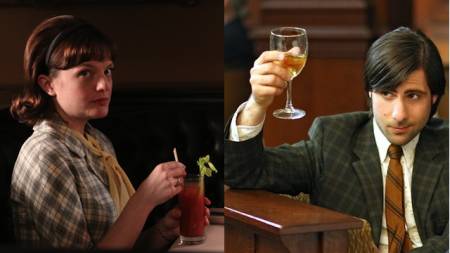
Elizabeth Moss, Jason Schwartzman in other roles
Portrait of the artist as a destructive young prick
Listen Up Philip, a mordantly witty 2014 Sundance hit, must be taken for what it is, its faults meshing with its strengths. It has an insufferable rising young writer protagonist no one will like, but this is what makes it fresh and unique work: his rapidly delivered caustic and narcissistic brutalities are the film's most delicious moments. The film's style is a mixture that makes a virtue of necessary roughness: set in a recent digital-free time with visual touches of French New Wave and Cassavetes shaky-cam. long-lens 16 mm. images, it embraces the indie no-budget roots from which writer-director (and in his last film, star) Alex Roth Perry is also beginning to emerge. Hollywood producers who came on board for this third feature permitted him to pick his dream cast: Jason Schwartzman, Elizabeth Moss, Jonathan Pryce, Dree Hemingway; for the protagonist's latecomer French academic adversary-girlfriend, Joséphine de La Baume; and for the voice-over narrator, Eric Bogosian.
This is a movie whose slightly over-written, fast-delivered dialogue a young Aaron Sorkin might have scripted for Noah Baumbach: the opening scene, in which newly successful young novelist Philip (Schwartzman) kisses off a former girlfriend recalls The Social Network's motormouthed Harvard date opener. Listen Up's central narrative device, borrowed from William Gaddis' mega-novel The Recognitions, is one that almost sinks it: the articulate asshole main character, Philip Lewis Friedman (Schwartzman, whose small stature, neat attire, and soft manner do much to make the character's egocentric meanness palatable) disappears for a big chunk of the middle of the movie. Moss and Pryce are eminently watchable in Schwartzman's absence, but the change of tone seems dubious even if this is what justifies the festival blurb's phrase celebrating Listen Up's "brazen mixture of bitter humor and unexpected pathos." Brazen, or simply awkward? Perry isn't yet as ready-for-prime-time here as Baumbach was when The Squid and the Whale got its celebratory 2005 debut at the 43rd New York Film Festival, but maybe he doesn't want to be. Anyway, Listen Up Philip (if this is about a persnickety writer, how come the comma is missing?) was the first film added to the 2014 NYFF's Main Slate. And it means to be, as was Squid, a quintessentially New York movie.
New York residents Alex Ross Perry, NYU Film School grad and Listen Up writer/director and his mostly-documentary collaborators dp Sean Price Williams (who also shot two other 2014 NYFF films, Iris and Heaven Knows What) and editor Robert Greene are young cinephiles and pals with skin already in the game. The trio met working at the legendary (and just recently defunct) East Village movie nerd destination Kim's Video. This is Perry's third feature, though he admits his previous one, Color Wheel, where he plays a grumpy writer himself, was on the "scrappy" side. Perry wants both to capture a New York state of mind and majorly evoke his literary idol Philip Roth. "Philip" is not only in the title. After he has hilariously alienated all those who might have helped him promote his second novel, Obidant, Jason Schwartzman's young novelist finds a friendly older mentor clearly based on Roth (or his books) and with the Rothian alter ego name Ike almost-Zuckerman (Zimmerman) -- the character played with sublime ease by Shakespearean actor and UK TV vet Jonathan Pryce. The movie's title even borrows its title font and end title invented jacket images from Portnoy and other Roth books. The plot borrows from Roth's The Ghost Writer and The Human Stain. Zimmerman, who adopts Philip during a dry spell and invites him to his woodsy country retreat, is the mature older model of the writer personality Philip has already become in fledgling form, a man who has discarded most of the friends and women in his life on the way toward lonely literary fame. “Don’t make yourself any more miserable than you need," Ike advices Philip. "Leave that to the women you love. That’s pretty much what they’re there for.” And there's lots more where that came from. Philip is on his way here, and happy to be so. Perry's "hero" is bravely austere. He keeps him a schmuck through and through. But neither Ike nor Philip is verbally crude or abusive, nor do they visibly destroy lives. The girlfriends Philip loses survive him, and Ike's daughter Melanie (Krysten Ritter) finally gives up on him and moves on too.
Zimmerman gets Philip an adjunct professorship in creative writing at a nearby college, extending his stay away from the city and from Ashley. On campus and in depressing faculty housing, he's lonely and alienates everybody -- though in a rare upbeat turn of events, that ends. People begin to like him and he starts sleeping with his self-declared departmental enemy, Yvette (de la Baume). He keeps missing Ashley and wanting to go back to her: Perry seems to be working and reworking the theme of failed relationships, with a heartless guy and a brave girl who eventually realizes he isn't worth getting back. Listen Up Philip, with its hole-in-the-middle, seems a patchwork at times, but the parts are often brilliant and original, and the academic moments and Zimmerman's pontifications are as good as anything in the first scenes, even if style seems to trump structure.
Listen Up Philip, 108 mins, also played, after its hit Sundance debut, at Locarno, Rio, Vancouver and London. It was screened for this review as part of the 52nd New York Film Festival October 9, 2014, a kind of apotheosis for Perry, Williams and Greene, with their New York friendship and declared love of the Press & Industry screening site, the Walter Reade Theater. It has a limited theatrical release coming 17 October and VOD 21 October.
Last edited by Chris Knipp; 11-20-2014 at 12:01 AM.
-
Bennett Miller: FOXCATCHER (2014)
BENNETT MILLER: FOXCATCHER (2014)
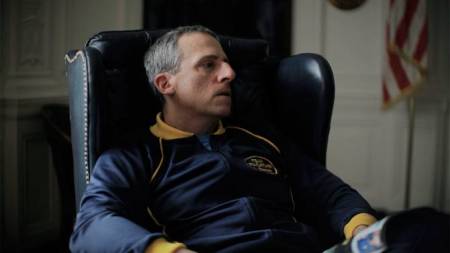
Steve Carell in Foxcatcher
A monotonous but memorable epic of crime among the rich
Bennett Miller's Foxcatcher is a big, important, epically slow movie. And rather excruciating. It certainly makes an impression. Viewers may want to compare it to Barbet Schroeder's Reversal of Fortune. Both are films about murder in the claustrophobic world of the very rich. But Schroeder's film, of course, is a complicated mystery. In Foxcatcher, the stiff, deluded mommy's boy John E. Dupont played by Steve Carell simply plays his crazy mind games with poor Mark Schultz (Channing Tatum), the champion wrestler he takes under his wing, and then becomes enraged at his older brother Dave (Mark Ruffalo), a wrestler and a coach, and shoots him to death with a pistol with an employee and Dave's wife (Sienna Miller) watching. In both films, though, one has the sense of greater danger because money insulates these people from reality and from a moral sense.
While Reversal of Fortune is drolly creepy and fascinating in its complexity and ambiguity, Foxcatcher is annoying and drags. It is repetitious. How do you make an interesting story about a neanderthal (Tatum's character) and a stiff madman (Carell's)? The film is well directed in that it gets the maximum effect out of these two characters and the setting. Their sick father-son relationship is deeply disturbing, wrong from the start. Both characters are wooden, but great use is made of their physicality. It seems the decision was made that because John Dupont was an ornithologist, he should be given a beak like a bird: hence the big artificial nose, which stands out a mile and makes the usually comic Carell's unaccustomed dark and serious role seem like a stunt. He speaks in a slow, stifled voice, seeming to mimic the accents of the Kennedys. His body is stiff; he looks into space, his face (and beak) held aloft. It's an imploded performance. Tatum's hulking body certainly convinces us he could be a wrestler, and Mark's vulnerability gradually emerges as pitiful. We're in the realm of Of Mice and Men. (His trajectory is left a bit up in the air.)
Mark's mistake in coming to Dupont's estate to train for the USA tournament and the Seoul Olympics, Dupont's fake wrestling expertise, his rigid notions of training and patriotism, are oppressive elements that weigh powerfully on the viewer. It's heavy-handed, and each point, each scene, runs quite a bit too long: half an hour could easily have been cut to make a sharper, more energetic film. Nonetheless it does work, beating viewers over the head with its significance till they begin to surrender.
If we go from Capote (NYFF 2005) to Moneyball to Foxcatcher, Bennett Miller's films have grown in complexity and viewer involvement, going from just interesting; to thoroughly engaging; to provocative and disturbing. (Whether he has grown equally as a director is another question.) Capote is just a character study: even though Hoffman's performance is a technical marvel the film is a little bit by-the-numbers. Moneyball is a suave and entertaining process film, highlighted by Brad Pitt's relaxed turn and the wit Aaron Sorkin may have added in. Now Miller has turned to this oddball, ugly piece of American history with its many implications. Foxcatcher touches on warped notions of dynasty, jingism and American exceptionalism, megalomania, absent parents and oppressively present ones who won't go away even when the child is in his forties or fifties. Even America's excessive presence of firearms raises its head most visibly: the Duponts, we learn, owed their original fortune to explosives. In telling his story, Miller uses all the physical trappings, the peculiar look of Carell, the hulk of Tatum -- and Ruffalo's more flexible and skillful but less heralded and thankless depiction of a wrestler who's also an actual human being. Outwardly, there's the grand house and horse farm estate in Pennsylvania, the training facilities, the private planes and helicopters. These aren't particularly used with subtlety (again, compare Schroeder). They're effective, like everything else. Dupont's craziness seems much the same at the end as at the beginning. Carell doesn't give us character development, if the screenplay even allows for it. But what does it matter? Foxcatcher is a movie you wish you could get out of your head, but you can't.
One wonders if this effect is justified by any profundity in Miller as a filmmaker, though, any resonance beyond his reliance on "real events." Mike D'Angelo wrote from Cannes in The Dissolve that "his films suffer from a failure of imagination, skimming lightly (but often self-importantly) over the surface of the verifiable." With Foxcatcher, it's beginning to look even more that way.
It's somewhat disheartening, therefore, that Variety called Foxcatcher "perhaps the sole credible awards-season heavyweight to have emerged from this year’s Cannes Film Festival." Perhaps help can come from abroad. Mike Leigh's Mr. Turner, for instance, is a lovely and nuanced picture, and grand in its own way.
Foxcatcher, 135 mins., debuted at Cannes, showing around the festival circuit, including Telluride, Toronto, Vancouver and London, and was screened for this review as part of the 52nd New York Film Festival. It has already acquired a host of raves, with some dissenters. It opens in the US 14 November, in the UK and France 9 and 21 January, respectively.
Last edited by Chris Knipp; 10-13-2016 at 09:27 AM.
-
LAURA POITRAS: CITIZENFOUR (2014)

Smpwden, Greenwald in the Hong Kong hotel room in Citizenfour
Film about Edward Snowden NSA revelations provides intimate footage
For those who have been following the news over the past sixteen months, Laura Poitras' Citizenfour contains little that is new in the way of revelations about NSA and the seizure of data about citizens worldwide by the US government. But what it provides is a concise picture of how these revelations got into the world's media and what they mean. And more vividly and humanly, if you will, it provides a seamlessly edited close-up look, intimate and in sharp focus, at one of the most famous men of our time: Edward Snowden. Poitras's film shows Snowden up very close for the key days of his June 2013 revelations in the hotel room in Hong Kong, talking to Glenn Greenwald and sometimes Ewen MacAskill, a Scottish Guardian correspondent, being photographed by Poitras, who remains invisible. Snowden is as calm, cool, and collected all the time as he was in his famous interview with Greenwald revealing his identity and stating his business.
This is rare and intimate footage of huge news in the making. It also prompts a thought: when will John Le Carré write a book about this subject? The Hong Kong hotel scenes are definitely from the pages of an as yet unwritten Le Carré novel, about a brave new world where "freedom" and "liberty" have been replaced by the word "privacy," and for anyone with a cell phone, including Angela Merkel, "privacy" has ceased to exist.
Just a man sitting in a room. But with today's electronic media, that's all you need to make big news.
Snowden clearly had the stuff to put his life on the line as he did, giving up contact with his family and leaving his girlfriend behind in Hawaii with only a note to say he'd be away a while. He clearly understands why he was doing what he did. What brings one man to do this and not others is a mystery. He hopes his action will bring many more whistleblowers.
The story begins with a series of emails (with the "citizenfour" identification) to Poitras with hints of revelations to come and a lot about incription. (Perhaps he knew she had been working for several years on a documentary about surveillance in the post-9/11 era.) The film then shifts to Greenwald in his home in the woods outside Rio where he lives with his partner and a lot of big dogs, connected by wire with world news media. Greenwald was then a Guardian correspondent. He now is a cofounder of a new truth-to-power news outlet, The Intercept, funded by eBay founder Pierre Omidyar, with a 12-person team including Poitras and Jeremy Scahill of the film and book Dirty Wars. Greenwald was to be the essential conduit of Snowden's revelations to the world's news media.
The footage providing context is important, but what matters most in Poitras' film are the dialogues in Snowden's hotel room. (Eventually he moves to her room in the hotel when he's been tracked down, to avoid calls.) As the dialogues go on, Greenwald's articles begin and major media coverage happens. And as it happens, we see Snowden watching CNN broadcasts about his revelations on his hotel room TV. (You could not make this up: the coverage is seamless and pefrectly paced, though telescoped in time.) Then the time to leave comes. Snowden packs up, apparently in a couple of plastic bags, spritzes his hair, shaves, and is whisked away. Hong Kong human rights lawyers consult with him at an unrevealed location. How he gets to Moscow is not revealed, though later we see him, joined by his girlfriend there, preparing food in a kitchen. After Snowden is away, in limbo, his communications with Poitras are shown, but they are guarded. The film ends with a scene in Russia between Snowden and Greenwald. Greenwald writes information about lines of communication going up to "POTUS" (President of the US) and Snowden says "You're fucking kidding!" With this cryptic final set of hints about a new whistleblower to come with even more explosive revelations, the film ends.
Citizenfour is produced by Stephen Soderbergh. It had its premiere as a late addition to the Main Slate of the 52nd New York Film Festival. It is a beautifully made film, filling in context and conveying a sense of place as it shifts from Brazil to Hong Kong to Berlin to Russia to US government and former CIA or NSA men who spoke up about the current collective electronic surveillance of everybody, everywhere before. To these men Snowden's revelations were not surprising. Only the extent and volume of the data collection was new to them. In fact information about these data collecting programs was already out there. But Snowden's willingness to come forward and risk his life to dramatize them has had great significance.
To the US government, Snowden is at least guilty of crimes, at most a traitor. To civil libertarians he is a hero. The latter will find this film inspiring. The former will find it repugnant.
Poitras considers Citizenfour to be the third and concluding film in a trilogy about the post-9/11 era. The first film, My Country, My Country, about the Iraq war, was nominated for an Academy Award, while 2010’sThe Oath (ND/NF 2010) won the excellence in cinematography award at Sundance. Citizenfour isn't just a hot news story, though it is that, but also an elegant documentary.
For more details see the Indiewire review by Eric Kohn, "'CITIZENFOUR' is a Bracing Look at NSA Whistleblower's Impact." AV Club also has a review of the NYFF finals with Citizenfour and Birdman.
Citizenfour, 114 mins., debuts at the 52nd New York Film Festival 10 October 2014, which has excelled in its documentary offerings. Watched for this review at a press and industry NYFF screening at Bow Tie Chelsea Cinemas, W. 23rd St., 10 October. Laura Poitras will discuss the film in a free HBO Directors Dialogues at Lincoln Center on October 11. Venues: Walter Reade Theater, Alice Tully Hall. US theatrical release begins 24 October. [It subsequently received extremely high critical ratings -- Metacritic 88% and rottontomatoes 97%.]
Last edited by Chris Knipp; 06-07-2023 at 12:32 PM.
-
Alejandro G. Iñárritu: BIRDMAN, OR (THE UNEXPECTED VIRTUES OF IGNORANCE) (2014)
ALEJANDRO G. IÑÁRRITU: BIRDMAN, OR (THE UNEXPECTED VIRTUES OF IGNORANCE) (2014)

MICHAEL KEATON IN BIRDMAN
Everything and more, in single takes
His space opera Gravity turns out not to have been Iñárritu's most technically challenging project with his whiz dp Emmanuel Lubezki, who again uses flowing virtuoso single-shot tricks he first learned filming Children of Men. No, the greater feat would be Birdman or (The Unexpected Virtues of Ignorance), whose whirlwind tour-de-force structure follows a cast-off comic book movie superstar (a motormouthed Michael Keaton) all around a Broadway theater where he is attempting to mount a vanity project that's to be a comeback and assertion of his literary seriousness and acting chops. It's a theatrical adaptation of Raymond Carver's short story, "What We Talk Abut When We Talk About Love." Hold your breath. There's lots more.
The trick? There are many. First of all the film is made to look shot in a single take, with the camera following Riggan Thomson (Keaton) seamlessly all around the long narrow corridors and nooks and crannies of the the complicated theater, up to its roof, even out into the crowds of Times Square and beyond. The main musical accompaniment, which is nearly incessant, is drums. And there's crazy stuff going on. Riggan can float in the air, and he has powers of teleportation, though he hides these from others, or maybe just imagines he has them. Also when others are not around, he is guided/plagued by a deep-resonant-voiced alter ego (actually Keaton's own voice, delivered at a booming lower register). With the long takes and the hyperbolic, apoplectic dialogues between Riggin and himself and each of three women in his life -- Lesley (Naomi Watts), Laura (Andrea Riseborough) and Sam (Emma Stone), all on the scene; his absurdly "method" costar in the play Mike Shiner (Edward Norton); his sycophantic producer (comic Zach Galifianakis, in mostly serious mode); even a key Broadway critic, Tabitha (Lindsay Duncan) who vows to "kill" his play -- Birdman never, ever stops for breath.
The effect is exhilarating if a bit exhausting, and the feel is unlike any other movie, though for some reason I was reminded of Leos Carax's transcendently weird Holy Motors (NYFF 2012). This isn't as original as Carax's film: its messages about love and being true to yourself and avoiding media frenzy are too easily summarized. But it, like Holy Motors, is a "trip" movie, spinning out continual surprises and about personal transformation and the magic of cinema, the wonder of playacting. The scene where Riggin gets locked outside the theater and walks through Times Square in his skivvies feels right out of Carax's film, and Keaton's current gnarly transformable face is not unlike Carax's muse Denis Lavant's.
While Gravity had little complexity in terms of human life stories and moral issues, Birdman, feeding on its literary inspiration Raymond Carver's human depth, does nothing but go over and over themes of career backlash, addiction and recovery, guilt and responsibility, Hollywood vs. legitimate stage, superman roles vs. serious acting, and career choices -- notably Riggin's long ago (like Keaton's own to play Burton's Batman) to play a high-flying "bird" superhero that's Icarus-like (though the pretension of the mythical analogy is mocked), a role that leads average folks to recognize him on the street and ask for fan photos and autographs. The irony is that he's a has-been, but he's loved.
Needless to say this is a Norma Desmond-like role for Keaton, who's playing an actor whose dilemma is not unlike his own, of never quite having gotten beyond the decades-ago Faustian bargain of taking on a big comic book superhero role that made him famous and, in sequels, made him big bucks, but then made it hard for him to get serious parts thereafter, or, when he got them, to be taken seriously in them. Against this theme is that of how Broadway nowadays keeps using movie stars to draw in the tourist audience and make money, and the serious theatrical fans' contempt for this current practice. And yes, Iñárritu and his everything-and-the-kitchen-sink cowriters Nicolas Giacobone, Alexander Dinelaris Jr., and Armando Bo also insist on making much of social media and the younger generation whose concept of fame is "going viral." But if such editorializing is obvious, contemporary references to Michael Fassbender, Robert Downey Jr. and Jeremy Renner, not to mention Justin Bieber and Roland Barthes, add to the smart contemporary satire. If this were all a play (though it's too cinematic to to be just that), it might be a reasonably complex and clever one.
Riggin has not only written his play adaptation of Carver's story (which in the event we don't see all that much of) but is directing it and starring in it, with a bathetic speech to bring down the house before intermission and blowing his brains out just before curtain time at the end. The movie plays around with reality and illusion from the first scene, where Riggin is meditating in a yoga pose floating in the air in his dressing room. It also plays with "acting" vs. "feeling." Riggin stages an accident to eliminate a costar he doesn't think worthy and in comes Shiner (Norton), who mysteriously kows all the lines, and also insists on rewrites. Some line reading moments are so strange we don't know if the actors are improvising, or just very good, or it's not a play at all. The play previews are disasters the public seems to like.
The single-take format focused on Riggin is readymade for a portrait of egocentrism: the movie literally revolves around its star. There may be desperation in Riggin's behavior, and absurd overconfidence in Shiner's, but both Keaton and Norton are wonderfully at ease. It's a pleasure to see them play off each other, and everybody in the cast seems to be enjoying the tight restriction of the shooting methods, which required that everything follow a strict predetermined plan as to movement, lighting, camera placement, etc.
In the circumstances, the women are somewhat slighted. For the play, Riggin has chosen to use a respected old friend (Naomi Watts) and a much younger actress he's having sex with (Andrea Riseborough); their moments with him, as the film's whirlwind whirls, are relatively brief, and their intensity doesn't register over the intensity of everything else. Daughter Sam, just out of rehab, is a somewhat cliched figure, and Stone, tattooed and scrawny, is intentionally less engaging than usual. Nonetheless Sam has better moments than the two older women and is allowed to be both her father's friend and his most outspoken critic -- other than the newspaper critic Tabitha, who plans to pan him for no other reason than that he is in her view just a "celebrity" and not a real actor. Needless to say, Keaton disproves this.
Whether all this is digestible is a good question, but Iñárritu & Co. have delivered a quite marvelous and original package nonetheless, moving into something unified, witty, and lively that relates more to the early parts of Amores Perros than to what Variety's Peter Debruge harshly called the "phony, contrived melodramas" that were the Mexican director's 21 Grams, Babel and Biutiful. I too was unmoved by those overwrought efforts, and thought Gravity overrated, a film that wasted its spellbinding setup. Birdman is overwrought too, but pleasingly different and wild fun.
Birdman or (The Unexpected Virtues of Ignorance), 119 mins., debuted at Venice, in other festivals, and a fitting virtuosic end as the closing night film of the 52nd New York Film Festival, where it was screened for this review. US theatrical release is a week later (limited), 17 October. Other countries have release dates in early 2015.
Last edited by Chris Knipp; 11-20-2014 at 12:04 AM.
-
ROUNDUP: 52nd New York Film Festival 2014

ROUNDUP: 52nd New York Film Festival 2014
As usual, the New York Film Festival had depth and high quality. If there wasn't anything to sweep me away like Amour and Holy Motors, an amazing trip like Life of Pi, anything as smart and witty as The Social Network or as profound as Sokurov's The Sun, this isn't the selection committee's fault, because this year seems a bit light on dazzlers. Personally I wasn't deeply impressed by any of the American features, but New York-related films came through strong with the street drug story Heaven Knows What, Gere's stunt as a homeless person Time Out of Mind, Perry's smart and mean Listen Up Philip, and Mexican director Iñárritu's Broadway theater tour de force Birdman.
Then we come to "foreign" films that were various kinds of delight. '71 is an intense historical thriller set in Bellfast at the height of the Troubles, and with it the French-born Yann Demarge, who works in England, emerges as a world class filmmaker. The Film Society favorite Hong Sang-soo's Hill of Freedom is another disarmingly slight-seeming little gem. Mike Leigh's Mr. Turner is both grand and quiet, a marvel of acting and the recreation of period the Brits can do so well. Abderrahmane Sissako shows himself to be one of the world's great filmmakers in the serene, beautiful, memorable Timbukto, which, almost surprisingly, is about jihadist brutality and violence in northeastern Mali. It still seems like a visual poem. There were a number of smart and elegant French films (nothing great from Latin America, nor anything else from Asia): the one I liked best is Bertrand Bonello's dreamy and beautiful Saint Laurent, for which he was able to assemble some tolerably cool actors, to say the least. Graf's German historical film Beloved Sisters was rich and beautiful. It's almost a miniseries though. And why are so many features over two hours? Assayas' Clouds of Sils Maria is an example of a serious art house film with ideas that overstayed its welcome because its editor put away his scissors too early.
The three "major" films idea, opening, centerpiece, and closing, is a bit phony from the cinephile POV, burt the Film Society's choices this year made sense. Fincher's big glitzy Gone Girl was an entertaining opener. I don't know what P.T. Anderson was doing with Inherent Vice, but he is a director I get excited about whose work gets into cineplexes. The closing film, Iñárritu's Birdman, is a welcome change of pace for him and a wild tour de force, if not as profound as it may think it is.
Below is a list I made up for a poll. Don't take it too seriously: five is an arbitrary limit, and I forgot to mention some things I liked, like the Hong Sang-soo, and made up the list before seeing Iñárritu's Birdman, which clamors for award consideration in various categories. So apparently does Bennett Miller's Foxcatcher, but I found that film very unsatisfying, far too long and too one-note, despite how uneasy it makes you. Something of the same could be said of Cronenberg's Maps to the Stars, which is clever and slick but makes no sense and misses its targets, its satire probably out of date. But as with some other choices (compare PTA), it's a film by a filmmaker whose failures you still have to see .
Another late item was Poitras' Citizenfour, which makes sense to include in the Main Slate though a documentary because of the outstanding importance of its subject, Edward Snowden at the moment of his NSA revelations in Hong Kong, and their meaning, but is also an exceptionally cleanly made film. The Festival had a lot of Spotlight on Documentary sidebar films and there were press screenings of some that showed merit, though mostly documentaries are something you watch if you're interested in the material, and they're rarely moving and unique as for example Man on Wire, To Be and To Have, or My Architect happen to be. Doc masterpieces are scarce as hen's teeth but "interesting" (to somebody) docs are very common and very available nowadays (a good thing, but a cause for festival jury reserve: for example, "Spotlight" NYFF film Merchants of Doubt was "interesting," but there are many films on closely related topics and the technique and look were boilerplate. Wiseman is an icon, like Maysles in his eighties still making documentaries, and everything he does demands festival attention. But what a bore he can be sometimes! Let me mention Ethan Hawke's doc debut Seymour: An Introduction, a charming and informative film about a remarkable elderly New York piano teacher (another New York film!), very well made and not to be dismissed just because its maker is a kind of celebrity.
BEST NARRATIVE FEATURE
1. '71 (Jann Demange 2014)
2. Mr. Turner (Mike Leigh 2014)
3. Timbuktu (Abderrahmane Sissako 2014)
4. Two Days, One Night/Deux jours, une nuit (Jean-Pierre, Luc Dardenne 2014)
5. Saint Laurent (Bertrand Bonello 2014)
[6. Beloved Sisters/Die geliebten Schwestern (Dominik Graf 2014)]
BEST DOCUMENTARY FEATURE
1. Citizen Four (Laura Poitras)
2. Tales of the Grim Sleeper (Nick Broomfield 2014)
3. Red Army (Gabe Polsky 2014)
4. Seymour: An Introduction (Ethan Hawke 2014)
5. Silvered Water, Syria Self-Portrait/ (Ossama Mohammed, Wiam Simav Bedirxan 2014)
[6. National Gallery (Frederick Wiseman 2014)]
BEST DIRECTOR
1. Mike Leigh, Mr. Turner
2. Abderramane Sissako, Timbuktu
3 Yann Damange, '71
4. Jean-Pierre, Luc Dardenne, Two Days, One Night
5. Bertrand Bonello, Saint Laurent
BEST LEAD PERFORMANCE
1. Marion Cotillard (Two Days, One Night)
2. Timothy Spall (Mr. Turner)
3. Jack O'Connell ('71)
4. Richard Gere (Time Out of Mind)
5. Ibrahim Ahmed (Timbuktu)
BEST SUPPORTING PERFORMANCE.
1. Kristen Stewart (Couds of Sils Maria)
2. Hannah Herzsprung (Beloved Sisters)
3. Ben Vereen (Time Out of Mind)
4. Mark Ruffalo (Foxcatcher)
5. Carrie Coon (Gone Girl)
BEST SCREENPLAY
1. Timbuktu
2. Mr. Turner
3. Listen Up Philip
4. Gone Girl
5. Saint Laurent
BEST ENSEMBLE
1. Mr. Turner
2. Saint Laurent
3. Heaven Knows What
4. Two Days, One Night
5. Birdman [originally Foxcatcher]

FSLC's NEW FILM COMMENT FEATURES GONE GIRL
Last edited by Chris Knipp; 10-13-2014 at 05:40 PM.
 Posting Permissions
Posting Permissions
- You may not post new threads
- You may not post replies
- You may not post attachments
- You may not edit your posts
-
Forum Rules
....................







 Reply With Quote
Reply With Quote














Bookmarks